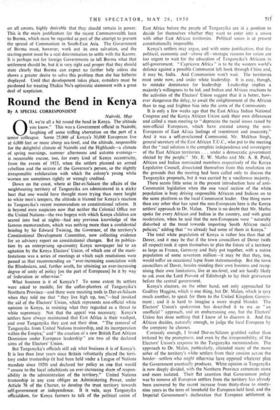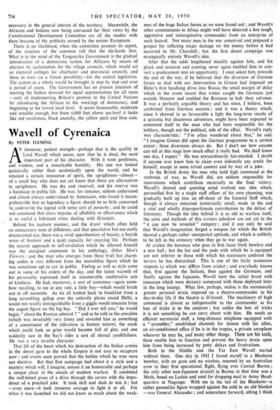Round the Bend in Kenya
By A SPECIAL CORRESPONDENT Nairobi, May
0 H, we're all a bit round the bend in Kenya. The altitude you know." This was a Government official in Nairobi, laughing off some trifling aberration on the part of a senior colleague. Some 25,000 of Kenya's 30,000 Europeans live at 6,000 feet or more above sea-level, and the altitude, responsible for the delightful climate of Nairobi and the Highlands—a climate of spring mornings, summer afternoons and autumn evenings— is reasonable excuse, too, for every kind of Kenya eccentricity, from the events of 1923, when the settlers planned an armed rebellion and the seizure of the Governor's person, to the slightly irresponsible exhilaration with which the colony's young white women are sometimes rightly or wrongly credited.
Down on the coast, where at Dar-es-Salaam the affairs of the neighbouring territory of Tanganyika are administered in a sticky heat that one would have thought more trying than mere height to white men's tempers, the altitude is blamed for Kenya's reaction to Tanganyika's recent memorandum on constitutional reform. It is beyond even suspicion now that neither the Colonial Office nor the United Nations—the two bogeys with which Kenya children are scared into bed at nights—had any previous knowledge of the famous 'memorandum, which was nothing more than a confidential briefing by Sir Edward Twining, the Governor, of the territory's Constitutional Development Committee, now collecting evidence for an advisory report on constitutional changes. But its publica- tion by an enterprising up-country Kenya newspaper led to an agitation by the Kenya Electors' Union, of which one of the mani- festations was a series of meetings at which such resolutions were passed as that recommending an " ever-increasing association with the Rhodesians, and, further south, for attaining an ever-increasing degree of unity of policy [on the part of Europeans] be it by way of federation or otherwise."
What business is it of Kenya's ? To some extent Its settlers were asked to meddle, for the coffee-planters of Tanganyika's Northern Province—and there were meaning nods in Dar-es-Salaam when they told me that " they live high up, too,"—had invoked the aid of the Electors' Union, which represents non-official white opinion in Kenya, in resisting what they regarded as a threat to white supremady. Not that the appeal was necessary. Kenya's settlers have always maintained that East Africa is their washpot, and over Tanganyika they cast out their shoe. " The removal of Tanganyika from United Nations trusteeship, and its incorporation within the Empire," and " the creation of a new British East African Dominion under European leadership " are two of the declared aims of the Electors' Union.
But Tanganyika's officials still ask what business it is of Kenya's. It is less than four years since Britain voluntarily placed the terri- tory under trusteeship (it had been held under a League of Nations mandate since 1920) and declared her policy as one that would " ensure to the local inhabitants an ever-increasing share of respon- sibility in the administration of the territory." United Nations trusteeship in any case obliges an Administering Power, under Article 76 of the Charter, to develop the trust territory towards self-government or independence. It is vain, says Tanganyika officialdom, for Kenya farmers to talk of the political union of
East Africa before the people of Tanganyika are in a position to decide for themselves whether they want to enter into a union with other East African territories. Political union is at present constitutionally impossible.
Kenya's settlers may argue, and with some justification, that the political, economic and—above all—strategic reasons for union are too urgent to wait for the education of Tanganyika's Africans in self-government. " Capricorn Africa " is to be the western world's defence against a possible Communist left hook through China and, it may be, India. And Communism won't wait. The territories must unite now, and under white leadership. It is easy, though, to mistake dominance for leadership. Leadership implies a majority's willingness to be led, and Indian and African reactions to the activities of the Electors' Union suggest that it is better, how- ever dangerous the delay, to await the enlightenment of the African than to nag and frighten him into the arms of the Communists.
It is only a few weeks ago that the East Africa Indian National Congress and the Kenya African Union sank their own differences and called a mass meeting to " deprecate the racial issues raised by non-official Europeans, which have created among the non- Europeans of East Africa feelings of resentment and insecurity." And it was a self-proclaimed Communist, Mr. Makhan Singh, general secretary of the East African T.U.C., who put to the meeting that the " real solution is the complete independence and sovereignty of the East African territories . . . under a democratic government elected by the people." Mr. E. W. Mathu and Mr. A. B. Patel, African and Indian nominated members respectively of the Kenya Legislative Council, dissociated themselves from this resolution on the grounds that the meeting had been called only to discuss the Tanganyika proposals, but it was carried by a vociferous majority.
There seems little sense in the present-introduction here of anti- Communist legislation when the one vocal section of the white population is busy driving responsible Africans and Indians on to the same platform as the local Communist leader. One thing more than any other that has upset the non-Europeans here is the Kenya settlers' approach to Dr. Malan. There is no doubt that Mr. Mathu spoke for every African and Indian in the country, and with great moderation, when he said that the non-Europeans were " naturally disturbed at the trend towards importing South African racial policies," adding that " we already had some of them in Kenya."
The total white population of Kenya is rather less than that of Dover, and it may be that if the town councillors of Dover (with all respect) took it upon themselves to plan the future of a territory as large as France, Germany and Italy put together, with a native population of some seventeen million—it may be that they, too, would suffer an occasional lapse from statesmanship. But the town councillors of Dover, besides minding their own business and recog- nising their own limitations, live at sea-level, and are hardly likely to ask even the Lord Provost of Edinburgh to lay their grievances before the central government.
Kenya's electors, on the other hand, not only approached Sir Godfrey Huggins, which is one thing, but Dr. Malan, which is very much another, to speak for them to the United Kingdom Govern- ment ; and it is hard to imagine a more stupid blunder. The Electors' Union's spokesman has described it to me as " an unofficial " approach, and an embarrassing one, but the Electors' Union has done nothing that I know of to disavow it. And the African decides, naturally enough, to judge the local European by the company he chooses.
Curiously enough, I found Dar-es-Salaam gratified rather than irritated by the promptness, and even by the irresponsibility, of the Electors' Union's response to the Tanganyika memorandum. The approach to Dr. Malan, particularly, alienated many of the more sober of the territory's white settlers from their cousins across the border—settlers who might otherwise have opposed whatever plan the Government eventually produces. White opinion in Tanganyika is now deeply divided, with the Northern Province extremists more and more isolated. Their flat assertion that Government policy was to remove all European settlers from the territory has already been answered by the recent increase from thirty-three to ninety- nine years as the term of leasehold for European-held land, and the Imperial Government's declaration that European settlement is
necessary in the general interest of the territory. Meanwhile, the Africans and Indians now being canvassed for their views by the Constitutional Development Committee are all the readier with them because of the publicity earned by the noisier Europeans.
There is no likelihood, when the committee presents its report, of the creation of the common roll that the die-hards fear. What is in the mind of the Tanganyika Government is the gradual introduction of a democratic system for Africans by means of election by acclamation for the village councils, which would act as electoral colleges for chieftains' and provincial councils, and these in turn—as a future possibility—for the central legislature. The system as a whole would be brought in step by step and over a period of years. The Government has no present intention of meeting the Indian demand for equal representation for all races —only of implementing Britain's promise to the United Nations by introducing the African to the workings of democracy, and beginning at the lowest local level. It seems honourable, moderate and sensible enough, but from 6,000 feet above sea-level it looks like red revolution, black anarchy, the yellow peril and blue ruin.







































 Previous page
Previous page